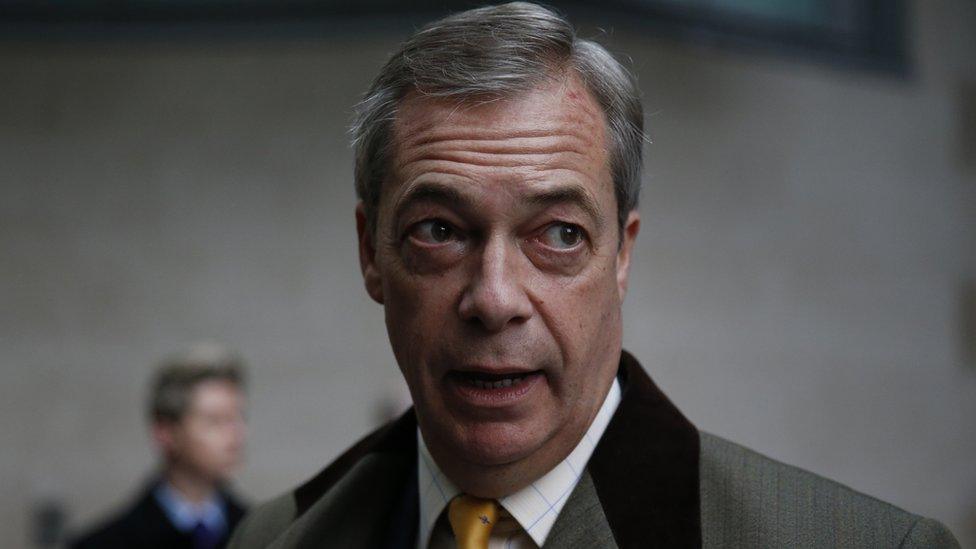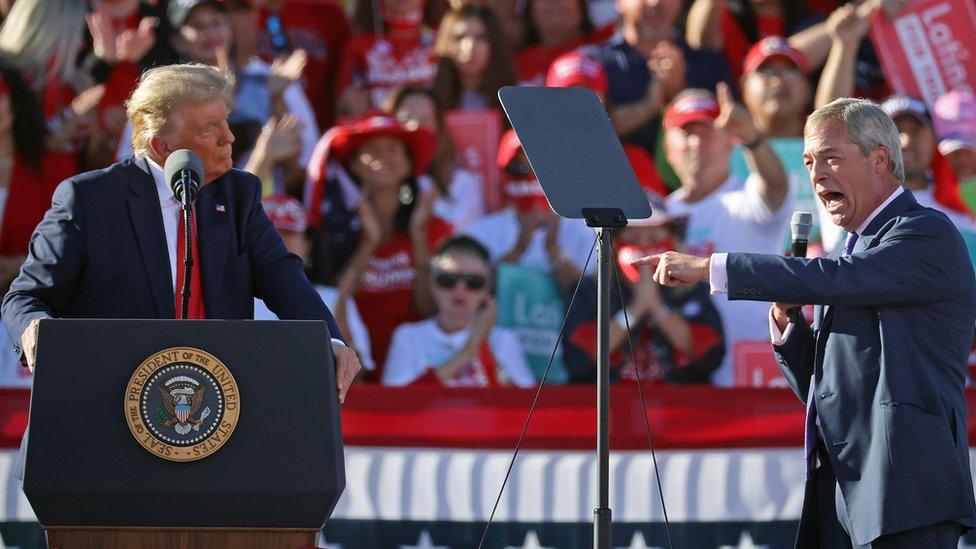Nigel Farage's anti-lockdown party: Future force or busted flush?
- Published

Love him or loathe him, Nigel Farage has proved himself a political force to be reckoned with.
At the helm of first UKIP and then the Brexit Party, he was the arch Eurosceptic.
But although the UK has now left the EU both legally and practically, Mr Farage isn't leaving the political fray.
Instead, the Brexit Party has been reborn as Reform UK.
It is the same legal entity, with similar branding and many of the same key players.
But with the new name comes a new focus - criticism of the government's handling of Covid and, in particular, opposition to prolonged lockdown.
Reform UK chairman Richard Tice said: "The suffering and the misery of an extended lockdown is so great that the real danger is that the cure is actually worse than the disease itself, in terms of the impact on the mental health of young children, the lost education, the inequality, the impact on businesses, the jobs lost.
"There is a huge impact, which is not being properly taken account of by ministers and MPs."
'Leader emeritus'
Mr Tice, a businessman and one of the founders of the Leave Means Leaves campaign, played a big part in the Brexit Party and is taking a leading role in Reform UK.
But Mr Farage is still at the helm, the "leader emeritus", as one senior figure put it.
Stephen Bush, political editor of the New Statesman, said his presence might be a turn-off for some younger lockdown sceptics.
"I think Reform UK have gone for absolutely the wrong political message in terms of the voters who are willing to give Nigel Farage a look", he said.
"A young , liberally minded person who doesn't like lockdown is not going to go, 'Hey, do you know who I think I might have something in common with? Nigel Farage.'"
'Way back in'
He acknowledged, though, that Mr Farage does hold particular appeal for a section of the electorate.
"Whether he misses the fun of being talked about, or just misses being a subject of conversation… the significant thing is that Nigel Farage is looking for a way back in," Mr Bush added.
"And whether it's got this name or another, Nigel Farage will find an issue that does appeal to those voters on the right of politics who do like him and do like what he's got to say."

Highs and lows of a long career

Led the UK Independence Party for a decade - on and off - from 2006, transforming it from a fringe outfit to a major electoral force
Farage played a leading role in the successful campaign to get Britain out of the EU in the 2016 referendum
Became a presenter on LBC Radio and, frustrated at delays to Brexit under Theresa May's premiership, he set up the Brexit Party
It won the most UK seats in the 2019 European Parliament elections
A friend of Donald Trump, Farage was one of the first politicians to meet him after his 2016 US election triumph and spoke at rallies in the run-up to Trump's defeat in 2020
Despite his high profile, he has tried - and failed - seven times to win a seat in the UK Parliament

Reform UK is trying to widen its appeal, promoting figures beyond Mr Farage to public-facing roles and pointing to a broader policy offer.
Beyond lockdown scepticism the party is focused on the economic recovery, reforming the tax system and improving the efficiency of the NHS.
Longer-term issues include overhauling the House of Lords, the voting system and the BBC.
At its heart the party is still offering an anti-establishment message, attempting to appeal to those who are frustrated by a political mainstream that they feel hasn't delivered for them.
So how nervous should other parties be?
'Trouble for Labour'
Professor Matthew Goodwin, a political scientist who has written extensively about the rise of UKIP and "populist" politics, said Mr Farage's previous ventures had posed a threat to the established order at the time, but without a key rallying cause he questioned whether Reform UK can really cut through.
"We saw how he caused so much trouble for Labour in the Northern heartlands, which essentially paved the way for Boris Johnson to win the Red Wall (of formerly Labour-held seats)," he said.
"But the million-dollar question now facing Nigel Farage is what are the big issues that he would use to take a new party to the same kind of heights?
"Anti-lockdown opinion is not strong enough in this country for an anti-lockdown party. The vast majority of us agree with the lockdowns.
"Immigration is no longer really a top-10 issue for voters. Europe is dwindling in our public imagination. I don't really see where that big open goal is for a new political party."
'Joy of democracy'
Senior party figures are conscious that success for Reform UK won't be easy, but they are convinced they have something to offer to those who feel politically homeless.
Mr Tice said: "I think there are a lot of voters out there who, have felt really uncomfortable with what the government has done and said, 'Well, what other options are there when I've got the right to express an opinion at the ballot box?'
"The joy of democracy, surely, is to have a range of options.
"Our position will be that we're the party that will most help the self-employed, the small businesses, the entrepreneurs, because those groups actually are the groups who've really suffered the most in this terrible Covid crisis."
May elections
The party is currently processing candidates to stand in England, Wales and Scotland in elections due to take place in May.
The pandemic is likely to limit campaigning ahead of the polls, which could be a particular problem for smaller parties trying to attract attention.
There's no doubt Nigel Farage has led parties that have shifted the political dial in the past, but without the rallying cry of Brexit it could prove much harder this time round.
Nonetheless, he's a politician with a knack of getting through to the electorate in a way few others can. Mainstream parties might dismiss him at their peril.
Listen to Alex's report on Reform UK on BBC Radio 4's The World at One at 1300 GMT.